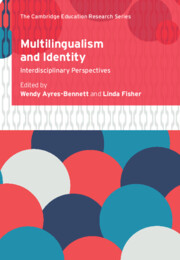Book contents
- Multilingualism and Identity
- Multilingualism and Identity
- Copyright page
- Contents
- Figures
- Tables
- Contributors
- 1 Towards Interdisciplinarity in Multilingual Identity Research
- Part I Situated Multilingualism and Identity
- 2 ‘Every Line Is a Lie’
- 3 Beyond ‘Narrating the Nation’
- 4 Metrolingual Practices and Distributed Identities
- 5 Migrants’ Identities in Multilingual Cities
- 6 Indexicalities in the Multilingual City
- 7 Multilingualism and Identity in Ningbo, China
- Part II Multilingual Identity Practices
- Part III Multilingual Identity and Investment
- References
- Index
3 - Beyond ‘Narrating the Nation’
Cultural Producers and Multilingualism in Wartime Ukraine
from Part I - Situated Multilingualism and Identity
Published online by Cambridge University Press: 22 July 2022
- Multilingualism and Identity
- Multilingualism and Identity
- Copyright page
- Contents
- Figures
- Tables
- Contributors
- 1 Towards Interdisciplinarity in Multilingual Identity Research
- Part I Situated Multilingualism and Identity
- 2 ‘Every Line Is a Lie’
- 3 Beyond ‘Narrating the Nation’
- 4 Metrolingual Practices and Distributed Identities
- 5 Migrants’ Identities in Multilingual Cities
- 6 Indexicalities in the Multilingual City
- 7 Multilingualism and Identity in Ningbo, China
- Part II Multilingual Identity Practices
- Part III Multilingual Identity and Investment
- References
- Index
Summary
Ukraine is the largest country by territory within the European continent and a global geopolitical flashpoint. At a time of trauma and transition, Ukrainian cultural producers have begun to confront questions of Ukraine’s national identity and linguistic diversity with new urgency and fresh perspective. This chapter sheds light on the evolving dynamic between multilingualism and identity in contemporary Ukrainian culture by employing the practices of both sociological and literary analysis. Through semi-structured interviews and close readings of prominent artistic texts, we focus on the ways in which Ukrainian cultural producers embrace linguistic diversity while simultaneously privileging the Ukrainian language and promoting national consolidation in wartime. This ‘practical multilingualism’ is particularly evident in literary and cinematic dialogues that feature characters discussing their belonging to Ukraine across languages. In the field of nationalism studies, such ‘scenes of talk’ (Herman 2006) invite a reassessment of the almost exclusive emphasis on narrative in analyses of the role of culture in the life of the nation.
Keywords
- Type
- Chapter
- Information
- Multilingualism and IdentityInterdisciplinary Perspectives, pp. 43 - 68Publisher: Cambridge University PressPrint publication year: 2022
- 1
- Cited by

